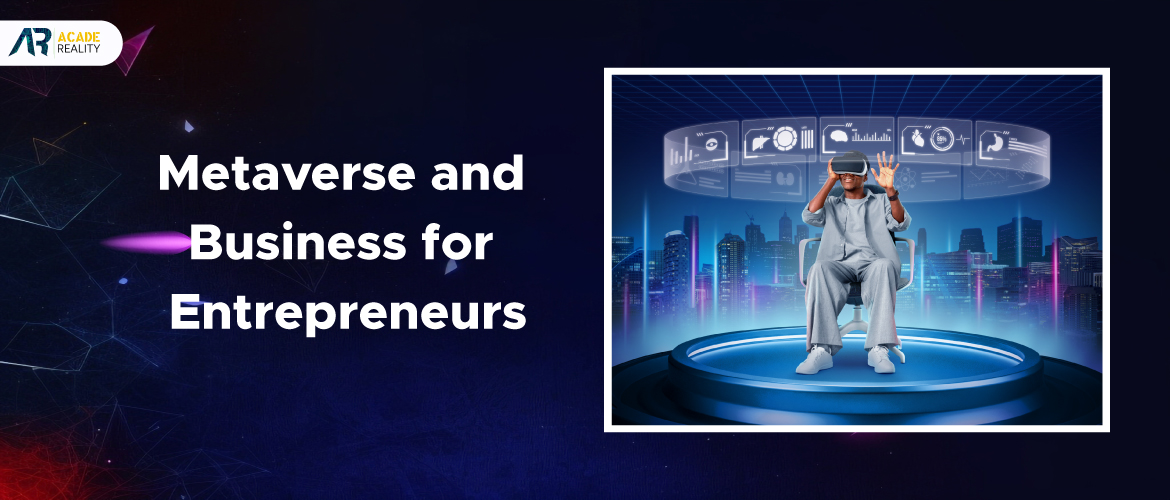Metaverse and Business: Opportunities and Challenges for Entrepreneurs

Introduction
The Metaverse, a concept that was once relegated to science fiction, is now rapidly becoming a part of our reality. As technology continues to advance at an unprecedented pace, the idea of a digital universe where people can interact, work, and play is no longer confined to the realms of imagination. For entrepreneurs, the emergence of the Metaverse presents a unique set of opportunities and challenges. Here, we will explore related to the business opportunities and challenges in metaverse present for entrepreneurs.
Understanding the Metaverse
Before we dive into the opportunities and challenges, it's essential to have a clear understanding of what the Metaverse is. The term "Metaverse" is derived from the combination of "meta-" meaning beyond and "universe." It represents a virtual, interconnected universe that transcends physical reality, enabling users to interact, create, and engage in various digital experiences.
In the Metaverse, users can immerse themselves in a vast, digital environment where they interact with other users, digital objects, and AI-driven entities. It's not a single platform or game but a collective space made up of various interconnected virtual and augmented reality environments. These environments can range from social spaces to entertainment, education, commerce, and more.
Challenges for Entrepreneurs in the Metaverse
While the metaverse presents a wealth of business opportunities, Metaverse Business Challenger also comes with its fair share for entrepreneurs looking to establish a presence in this emerging digital realm. Navigating these obstacles is crucial to ensure long-term success. Here are some of the key challenges faced by entrepreneurs in the metaverse:
1. Technical Complexity
Developing for the metaverse is technically demanding. Entrepreneurs must navigate multiple platforms, devices, and standards, which can be a challenge, particularly for newcomers to the space.
2. Monetization
While there are vast opportunities, monetizing in the metaverse can be tricky. Balancing user expectations, virtual economies, and the need for profit is a constant challenge.
3. Regulation and Legal Issues
The metaverse raises numerous legal questions, from intellectual property rights to data privacy. Entrepreneurs must stay informed about evolving regulations and adapt their business models accordingly.
4. Competition
The metaverse is attracting a lot of attention, leading to fierce competition. Entrepreneurs need to find unique niches or innovative solutions to stand out.
5. User Adoption
For the metaverse to thrive, it requires a critical mass of users. Entrepreneurs must work on strategies to encourage people to adopt and engage with their metaverse platforms and services.
6. Content Creation
High-quality content is crucial for success in the metaverse. Entrepreneurs need to invest in content creation and user engagement to keep their platforms relevant and appealing.
Metaverse Business Opportunities
Let's take a closer look at some of the prominent metaverse business opportunities:
1. Virtual Real Estate
Metaverse platforms, such as Decentraland and The Sandbox, allow users to buy and develop virtual real estate. Entrepreneurs can invest in these platforms, purchase virtual land, and then develop and sell it to others. This real estate can be used for various purposes, from virtual storefronts to event spaces. The value of virtual real estate is rising as more users flock to the metaverse, making it a potentially lucrative venture.
2. Digital Goods and Services
The metaverse is home to a thriving marketplace for digital goods and services. Entrepreneurs can create and sell virtual assets, such as clothing, accessories, or even entire avatars. Digital artists and designers can offer their services to users looking to customize their virtual appearances. Moreover, content creators can produce virtual experiences and sell them to users who seek immersive entertainment.
3. Advertising and Brand Promotion
In the metaverse, advertising takes on a new dimension. Entrepreneurs can establish advertising agencies specializing in the metaverse, assisting businesses in creating and managing their virtual presence. Brands can sponsor events, create virtual showrooms, or even run interactive advertising campaigns within the metaverse. The possibilities for creative and engaging advertising are endless, providing ample opportunities for those with marketing expertise.
4. Entertainment and Gaming
Gaming and entertainment have been at the forefront of the metaverse's appeal. Entrepreneurs can develop innovative and immersive gaming experiences that leverage the metaverse's capabilities. This could range from multiplayer VR games to virtual theme parks. The metaverse offers a rich canvas for creating novel and engaging entertainment options.
5. Education and Training
The metaverse has the potential to revolutionize education and training. Entrepreneurs can build virtual classrooms, training simulations, and educational content. These platforms can cater to students of all ages, offering a highly interactive and engaging learning experience. The metaverse's global reach can connect learners and instructors from around the world.
6. Collaboration and Remote Work
The pandemic accelerated the adoption of remote work, making the metaverse an appealing space for entrepreneurs. Developing platforms for remote collaboration, meetings, and virtual workspaces can be a lucrative endeavour. Businesses are increasingly looking for ways to make remote work more engaging and productive, and the metaverse provides an ideal environment for this.
Metaverse Challenges Faced by Entrepreneurs
While the metaverse holds tremendous potential, it also poses significant metaverse challenges that entrepreneurs must overcome:
1. Technical Complexity
The metaverse is a complex ecosystem. Entrepreneurs must grapple with various platforms, hardware devices, and standards, each with its unique requirements and limitations. The need to develop VR, AR, and multiple operating systems can be technically demanding, requiring specialized knowledge and expertise.
2. Monetization
Monetizing in the metaverse is a delicate balancing act. Users often expect free or low-cost entry to virtual worlds, making it challenging for entrepreneurs to generate revenue. At the same time, maintaining a functioning economy with virtual currency and goods requires careful planning and execution. Finding a sustainable business model that pleases both users and investors is an ongoing challenge.
3. Regulation and Legal Issues
The metaverse introduces a multitude of legal and regulatory challenges. Entrepreneurs must navigate complex issues such as intellectual property rights, data privacy, and virtual property ownership. The evolving legal landscape in the metaverse demands constant vigilance and adaptation to comply with regulations and protect their businesses.
4. Competition
The metaverse is attracting a growing number of entrepreneurs and investors. As a result, competition in this space is intensifying. Entrepreneurs must find ways to differentiate their offerings, whether by targeting specific niches or by innovating in their approach. Standing out in a crowded market is a significant challenge.
5. User Adoption
The metaverse's success depends on user adoption. Entrepreneurs need to convince people to embrace and engage with their metaverse platforms and services. Overcoming the initial hurdles of getting users on board and ensuring they remain active in the metaverse is an ongoing challenge.
6. Content Creation
High-quality content is the lifeblood of the metaverse. Entrepreneurs must continually invest in content creation, user engagement, and platform maintenance to keep their virtual spaces relevant and appealing. This requires a commitment to ongoing creativity and innovation.
Navigating the Metaverse: A Guide for Entrepreneurs
As entrepreneurs venture into the metaverse, it's crucial to approach it with a strategic mindset. Here are some key steps to navigate the metaverse successfully:
1. Educate Yourself
Stay informed about the latest developments in the metaverse, including emerging platforms, technologies, and trends. Attend conferences, read industry publications, and network with experts in the field.
2. Identify Your Niche
Find a specific area within the metaverse that aligns with your expertise or interests. Specializing in a niche can help you stand out and attract a dedicated user base.
3. User-Centric Approach
Prioritize user experience and engagement. Understand the needs and desires of your target audience and tailor your offerings to meet their expectations.
4. Technical Expertise
If you lack technical skills, consider partnering with or hiring professionals who have experience in developing VR, AR, and other metaverse technologies.
5. Compliance and Security
Stay vigilant about legal and regulatory compliance, including data privacy and intellectual property rights. Work with legal experts to ensure your business adheres to all relevant laws.
6. Innovation and Differentiation
Continuously innovate to stay ahead of the competition. Offer unique features or experiences that set your business apart from others in the metaverse.
Conclusion
The metaverse represents a groundbreaking frontier for entrepreneurs, offering a multitude of Metaverse Business Challenger. From virtual real estate and digital goods to advertising and education, the possibilities are vast. However, navigating the metaverse is not without its obstacles, including technical complexity, monetization, regulation, competition, user adoption, and content creation.
Entrepreneurs who approach the metaverse with a well-informed, user-centric, and innovative mindset have the potential to thrive in this emerging digital landscape. Success in the metaverse will require continuous adaptation and a commitment to delivering high-quality experiences that resonate with users. As technology advances and user adoption grows, the metaverse is poised to become a central arena for entrepreneurship in the digital age.
You Might Like





